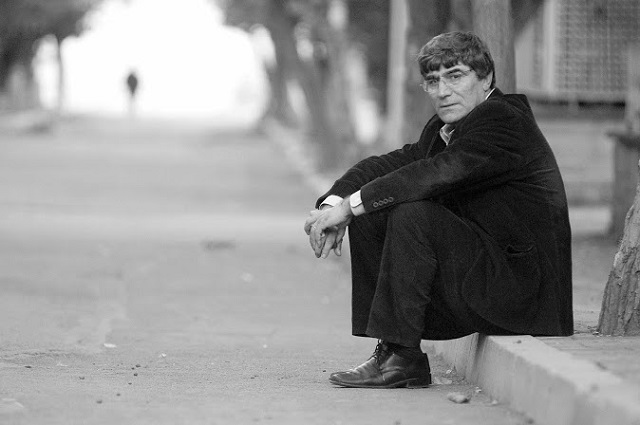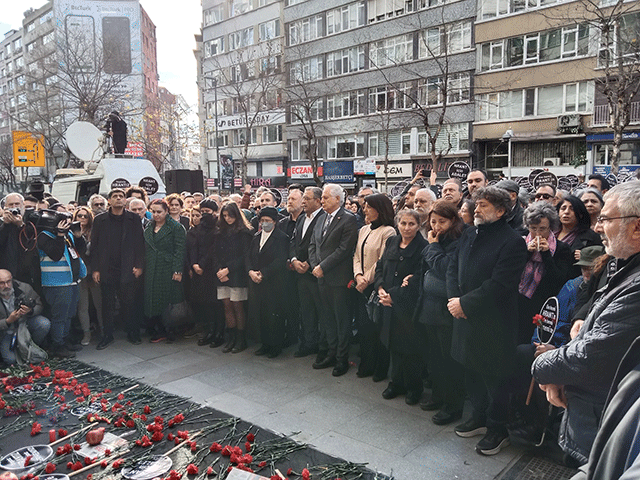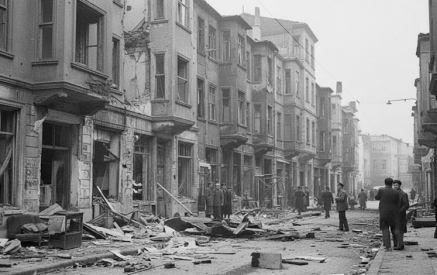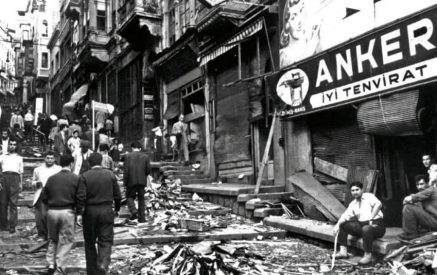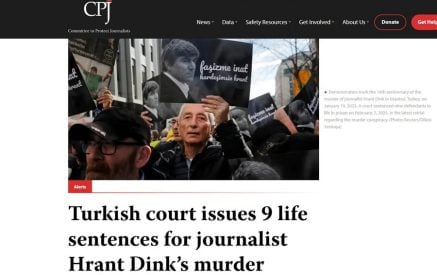On Thursday, January 19 at 15:00, Hrant Dink was commemorated where he was assassinated 16 years ago, in front of the Sebat Building which used to house the office of the Agos Newspaper. In addition to the gathering in front of the Sebat Building, thousands of viewers from outside Istanbul were able to participate in the commemoration through the live broadcast in English and Turkish.
2022 International Hrant Dink Award laureate Shaharzad Akbar sent a message where she touched upon the unrelenting struggle the women of Afghanistan and Iran put up against oppression, injustice and misogyny.
Bircan Yorulmaz of the Friends of Hrant, who was wrongly incarcerated for two years and was emancipated in November greeted all of Hrant Dink’s friends who are imprisoned for wanting an equal, free, just, democratic and peaceful world and country. Bircan Yorulmaz read the letter sent from the Bakırköy Prison by Çiğdem Mater, imprisoned since April under the Gezi Trials. In her message, Ciğdem Mater said “We are here in the hope of the days when we will be able to face the past and give everyone their due.”
Read also
At the commemoration where each year unreciprocated demands for justice are voiced, this year Emin Alper addressed the crowd. In his address, Emin Alper drew a picture of what it means to be a minority in Turkey. Alper stressed that humanity’s story against the strong’s oppression of the weak and the violation of rights had to change and that this change was only possible through solidarity and by addressing the majority.
Emin Alper’s address:
“Hello, dear friends,
Today, it has been exactly 16 years. Again, with a heavy heart, again, with the belief that justice has not been fully served and with the knowledge that the darkness that created those murderers has never dissipated, perhaps even darkened, we are gathered once again on the pavement where his body lies silently for eternity.
It has been exactly 16 years since Hrant Dink was murdered. Blood is still oozing from the wound of our friend lying on the pavements of Osmanbey. The blood flowing thinly between his two feet turned inwards is looking for a way out. It is looking for a way through the crowds of people running around in their daily rush, through the angry friends crying after him, under the gates of courtrooms that have become a wall against the search for justice, in front of the homes of the instigators full of hatred and rancour where they return peacefully in the evenings, through the ruins of Kamp Armen, to Malatya, where he was born, to the Anatolian lands.
This thin leak will find its own path. Hrant’s blood will meet the blood seeping from the boat Mustafa Suphi and his friends were taken in, from Sabahattin Ali’s broken spectacle glass, from between Musa Anter’s white hair, from every inch of Anatolia in 1915, from the mountains of Dersim in ’38, from the broken shop windows of Istanbul in ’55, from Maraş and Sivas. The blood of the innocents who have been massacred in these lands for years just because they were Armenian, Greek, Kurdish, Alevi or a minority, and the blood of the intellectuals who were killed just because they wanted equality and fraternity are merging looking for a path to flow.
Those who see these paths say, “how much blood has been shed”. But how few were their numbers. They were few, but their blood flowed greatly. Because being few was always a sufficient reason to be persecuted in these lands. The few attracted the wrath of the majority only because they were few. “You are many, you are strong, and you think you are right, yet you have failed, time and again, to make me be like you,” the minority said to the majority, “and as long as I exist, your rule will not be complete and perfect”. That is why the majority hated the minority. It wanted to render it invisible, to silence it, to drive it out, to kidnap it, to destroy it completely.
The majority never liked to be held responsible for the calamities that befell them. Since the majority could do no wrong, the minority was always the cause of the disasters that befell it. Minority meant threat. It was the hidden or visible partner of enemies. They were tailed, the meat of the animal they slaughtered was inedible, they transmitted diseases, they were the ones who kidnapped our children, those who tried to destroy our unity and solidarity, those who complained about our country abroad, those who had eyes set on our land, separatists, agents, traitors, and collaborators.
The majority wanted to eliminate the minority because the minority was unprotected. Humanity liked to direct its resentment, jealousy, anger, and hatred against the most vulnerable when it could not direct it against its real target. Violence against the vulnerable was profitable because the perpetrators were less likely to be harmed in the end. The more silent, fatalistic, and cowardly a person was towards their boss or the power that ruled them, the powerful that oppressed them, the more silent, fatalistic, and cowardly they were in the face of the hardships and disasters of life, the more brutal they were towards the minority they scapegoated. Because they knew in their heart that violence against an unprotected minority would go unpunished. And those in power… They, too, incited the majority against imaginary enemies, just so the anger of those below would not be directed against them. Those in power organised, directed, encouraged the perpetrators, and promised them impunity.
This story was not unique to these lands, but to humanity. Destructions, tragedies, exiles, migrations, massacres, and genocides were repeatedly staged in almost every single region of the world in every era of modern history. The majority hated the minority. But most of all, they hated those who spoke on behalf of the minority; those who demanded the right to live not as pariahs but as equal and free citizens; those who did not hesitate to point out the crimes committed against them one by one to the faces of the perpetrators. Hrant Dink was one of those incorrigible ringleaders of history. It was not possible for them to tolerate him because he was a voice that could speak honestly without being provocative, denounced enmity without being hostile, managed to be uncompromising without being belligerent, was brave because he did not know any other way of being other than being brave, shook without shouting, and made every heart he reached tremble. He was a socialist who fought not only on behalf of Armenians but also on behalf of all the oppressed and silenced. He was a descendant of the Kirkor Zohrabs. It was impossible for them to tolerate this voice. And those who committed crimes in the name of the sensitivities of the majority murdered him right here 16 years ago.
This is how the story of humanity began and this is how it has continued, but it never has to end like this. We can and we must change this story. If we seek justice, if we want those who killed Hrant to be punished, not only the shooters but also the instigators, not only the instigators but also the provocateurs, the masterminds, those who instil enmity and hatred; if the blood of not only Hrant but also that of thousands of innocents who were murdered in this land still trickles among us, we must change this story. We must come together, stand shoulder to shoulder, side by side in solidarity against the violence of the majority and the government to rewrite this story. Because a person in solidarity is not defenceless. If the woman who is brutally murdered by her husband or lover is not alone, if the Kurdish or Syrian who is lynched, the Armenian who is murdered, the Roma who is subjected to discrimination, the LGBTI individuals whose right to live the life they want as they want it is taken away are not alone, then we are not defenceless. We stand ready to ask for accountability for the violence against one and all of us.
The story of humanity has to change, and we will change it. First by standing in solidarity and standing side by side, and then by addressing the majority. By telling it, “You are happy with us, not without us”. We are not the other who hates you, but the richness that multiplies you. Your hatred is not only destroying us but also you. We did not build this system based on exploitation and discrimination, where the strong oppress the weak and human dignity is trampled underfoot, but we can bring it down together. You are not facing enemies but friends. When you wake up every morning, you will see your brother before you. You will lean on him and say “stop” to those in power who feed on pain, blood, and exploitation, to those who create enemies only to serve their interests, to those who bid innocent people against each other to protect their seats. It is not impossible to live together, to bury hatred deep in these lands.
From the pavements of Osmanbey to Hozat, from Hozat to Sason, from Sason to Van, from Van to Diyarbakır, the blood paths stretch along the horizons. One day, we will erect monuments on the corners of these roads. We will learn the story of and mourn each victim individually. This is how we will change the story of humanity. Because we are Hrant’s friends, and we made a promise to him: a promise to live together equally, humanely, and freely. We are here today to remind ourselves of that promise once again. We are here to say in unison “You are my brother Hrant, in the face of fascism”. Just as we will be women, Alevis, Kurds, gays, or transgender people tomorrow, today we are here to shout with pride, proudly and stubbornly that we are all Hrant, we are all Armenians. We are here to take the pens that write history from the hands of murderers and write the story of brotherhood together.
Then once again, once again and in unison: “In the face of fascism, you are my brother Hrant”.
Hrant Dink Foundation




















































